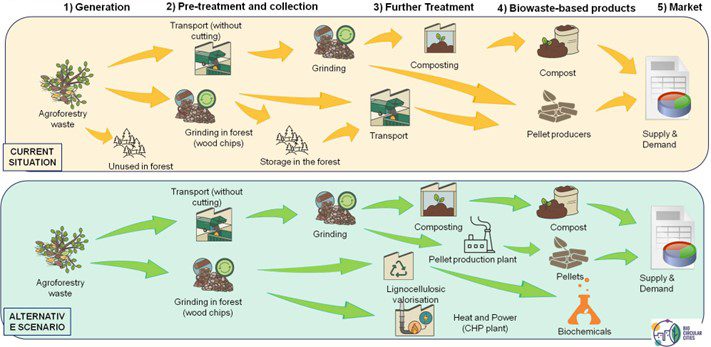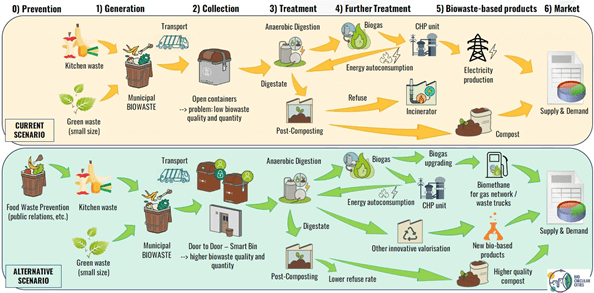Work carried out during the first year of the Biocircularcities project led to the suggestion of alternative scenarios to implement a circular bioeconomy pattern in the pilot territories for three selected biowaste chains.
The scenarios are based on a detailed analysis of the current situation in each pilot area, described in a report whose public summary is available here.
Province of Pazardzhik (PP)
The chain of forestry wood biomass residues will be analysed. Currently, forestry waste in the Province of Pazardzhik is mostly used for wood pellet production, although due to logistic constrains (mountain areas), more than 30% of the forestry residues remain unused in the forest. Increasing the collection of this type of waste may lead to new business opportunities with positive environmental impacts such as thereduction of the forest fire risk. Two alternative scenarios for the use of forestry residues will be investigated:
- Energy valorisation for coproduction of elecctricity and heat (congeneration unit)
- Lignocellusic valorisation to produce biochemicals.
Metropolitan City of Naples (MCN)
Biowaste from the coffee chain will be analysed. Currently, this type of waste is treated in the same plants that receive municipal biowaste: anaerobic digestion or composting plants. In the alternative scenario, coffee silverskin is stored and then transported for treatment to extract functional ingredients that are then used to produce high-fibre bread. The case study under investigation is already running at a pilot scale; it is based on about 8.8 tonnes of silverskins recovered from different coffee industries in the MCN in 2021.
Metropolitan Area of Barcelona (MAB)
The ECOPARC 2 is a Mechanical Biological Treatment ( MBT) facility managing biowaste and residual waste separately collected from municipal waste in Metropolitan Area of Barcelona . The potenitial environmental and economic impacts/benefits generated by the current treament of municipal biowaste (Ecoparc 2) will be compared with the following alternative scenario:
- the introduction of prevention measures to reduce the generation of food waste,
- a change in the separate collection of biowaste from open street containers to door-to-door collection and/or smart bins to increase the quality and quantity of biowaste collected, and
- the upgrading of the biogas produced by anaerobic digestion into biomethane to be injected into the local gas grid or used as biofuel for waste trucks transportation.


